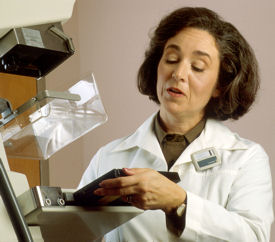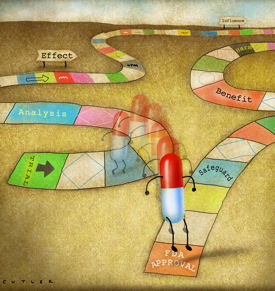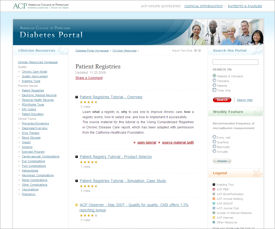Mammography poses small benefits, latent risks in elderly
Like all screening exams, mammography has a potential adverse effect on comfort, function and psychological well-being.
A study found that regular mammography among women age 80 and older was associated with earlier disease stage. Published in the May 20, 2008 Journal of Clinical Oncology, the study evaluated a Medicare database of more than 12,000 women age 80 or older who were diagnosed with breast cancer, and assessed the effects of mammography on survival. Researchers noted that improved survival could not be tied directly to mammography as regular mammography users also had improved survival from all causes, suggesting that healthier patients were more likely to undergo screening.
Screening mammography, like all cancer screening tests, has potential drawbacks, including adverse effects on survival, comfort, function and psychological well-being emanating from all procedures that result from screening. The drawbacks of screening mammography are particularly important to consider in frail elderly women because their likelihood of deriving benefit from screening is small.

In the randomized trials on which current guidelines are based, the difference in breast cancer mortality between screened and unscreened groups does not become noticeable until five years after screening, making it unlikely to benefit frail elderly women who are not expected to live more than five years. In addition, frail elderly women with limited life expectancies are at increased risk for experiencing adverse effects that can occur immediately after screening and can cause substantial harm. Patients and clinicians should be aware of the spectrum of potential drawbacks in order to make informed screening mammography decisions.
False positive results. Cancer screening tests are not always accurate. The majority of women who have an abnormal screening mammogram do not have cancer but are still subjected to the physical and psychological discomforts from diagnostic testing and procedures to work-up the abnormal result.
The degree of discomfort experienced depends on the individual, but likely is greater in frail elderly women who often have cognitive, physical, or sensory problems that make follow-up tests and procedures (e.g., diagnostic mammograms, biopsies) particularly painful, difficult, or frightening.
Women with dementia may be frightened by procedures they do not understand and unable to cooperate with instructions resulting in suboptimal outcomes. For example, while the accuracy of mammography for detecting cancers increases with advancing age (since the breast's radiographically dense fibroglandular tissue decreases), if an older woman is unable to cooperate with screening procedures due to dementia or other medical problems that make it difficult to stand still during the mammography, the result will be a poor quality study requiring additional diagnostic procedures. Such scenarios were common in a study of screening mammography involving 216 frail elderly women of whom 13% experienced a false-positive mammogram. Therefore, there is a significant risk that frail elderly women will experience the drawback of having a false-positive screening result and the discomfort and distress from subsequent follow-up procedures.
Unnecessary treatment. Another even more serious potential drawback of cancer screening is the detection and subsequent treatment of inconsequential disease that never would have come to clinical attention during a woman's lifetime had she not been screened.
The risk that screening mammography will identify an inconsequential breast cancer increases as a woman's life expectancy decreases, such that frail elderly women with limited life expectancies are at increased risk for unnecessary treatment. It is not uncommon for screening to detect indolent neoplasms, such as ductal carcinoma in situ (DCIS), that rarely progress to cause symptoms, even over many years. For women older than age 70, there is roughly a 1 in 1,000 chance that screening mammography will identify DCIS, a noninvasive form of breast cancer, that would not have been found without screening, and many of these women will undergo surgery.
Frail elderly women who undergo treatment for inconsequential disease found by screening have suffered serious psychological and physical harms from screening, which may include adverse effects from surgery, radiation, or chemotherapy such as delirium, functional decline, or even death, as well as distraction of care from pressing medical problems.
For example, take the story of an 80-year-old woman with severe dementia due to multiple strokes who had two 1-cm asymptomatic densities in her right breast detected on screening mammography. She underwent an ultrasound and two fine needle biopsies, which gave inconclusive results and caused her great agitation. She then underwent excisional biopsy and was diagnosed with DCIS. The biopsy was complicated by a painful wound infection requiring daily trips to wound clinic and ultimately surgical closure of the wound three months later. Six months later she suffered a large stroke and died. She spent the last year of her life being treated for a screen-detected disease that would never have affected her rather than receiving care focused on improving her current health problems and maximizing her quality of life.
Given that screening mammography has potential drawbacks that can result in substantial harm, especially in women with limited life expectancies, cancer screening decisions in elderly women should be individualized. Individualized decisions involve weighing potential benefits and risks of screening in the context of an older woman's health and life expectancy and considering her values and preferences, rather than deciding for or against screening based solely on a woman's age. With such an approach we may find ourselves recommending screening mammography to a healthy 85-year-old woman while recommending against screening a frail 70-year-old woman with severe dementia or end-stage renal disease. By encouraging informed individualized decisions, screening mammography may be more appropriately targeted to elderly women for whom the potential benefits outweigh the potential drawbacks.




